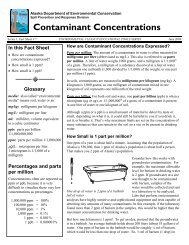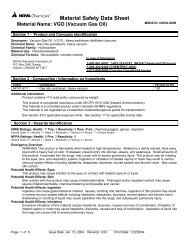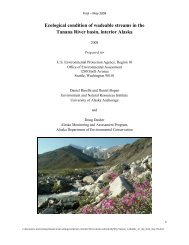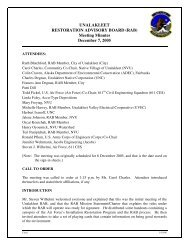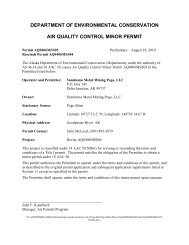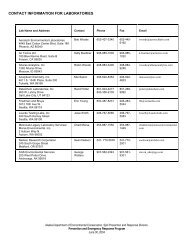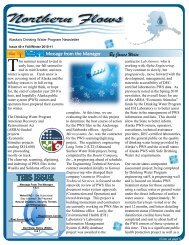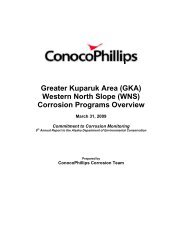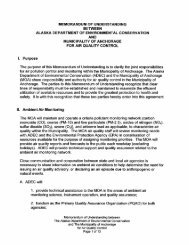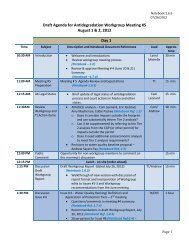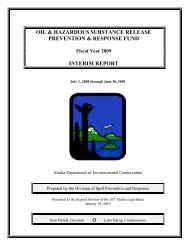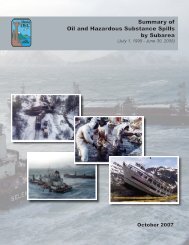2012 Ocean Ranger Guidebook Revision 3-7-12 - Alaska ...
2012 Ocean Ranger Guidebook Revision 3-7-12 - Alaska ...
2012 Ocean Ranger Guidebook Revision 3-7-12 - Alaska ...
Create successful ePaper yourself
Turn your PDF publications into a flip-book with our unique Google optimized e-Paper software.
<strong>20<strong>12</strong></strong> <strong>Ocean</strong> <strong>Ranger</strong> <strong>Guidebook</strong> 3-7-<strong>12</strong><br />
have further agreed that the discharge of graywater will comply with all applicable laws<br />
and regulations. For vessels whose itineraries are fully within US territorial waters,<br />
discharge shall comply fully with U.S. and individual state legislation and regulations.<br />
The term graywater is used on ships to refer to wastewater that is generally incidental to<br />
the operation of the ship. The International Maritime Organization (IMO) defines graywater as<br />
including drainage from dishwasher, shower, laundry, bath and washbasin drains. The US Clean<br />
Water Act (formally know as the Federal Water Pollution Control Act) includes galley, bath and<br />
shower water in its definition of graywater. The US regulations implementing this act do not<br />
include a further definition of gray water. However, the regulations do include a provision that<br />
exempts all of the wastewater included in the IMO definition and other discharges incidental to<br />
the operation of a ship from the Clean Water Act’s permitting program (formally known as the<br />
National Pollution Discharge Elimination System (NPDES) program). Finally, the US Coast<br />
Guard regulations include provisions that essentially combine the two definitions from the IMO<br />
and the Clean Water Act. None of the definitions of graywater include blackwater (discussed<br />
below) or bilgewater from the machinery spaces. Recent U.S. Legislation places limits on the<br />
discharge of graywater in the <strong>Alaska</strong> Alexander Archipelago.<br />
Handling Method Employed by Member Lines:<br />
Graywater is discharged only while ships are underway and proceeding at a speed of not less than<br />
6 knots, in recognition that dispersal of these discharges is desirable and that mixing of these<br />
waters, which are discharged approximately 10-14 feet below the surface, by the action of the<br />
propellers and the movement of the ship, provides the best dispersal available.<br />
O. Blackwater: Waste from toilets, urinals, medical sinks and other similar facilities is<br />
called "blackwater." CLIA members have agreed that all blackwater will be processed<br />
through a Marine Sanitation Device (MSD), certified in accordance with U.S. or<br />
international regulations, prior to discharge. For ships traveling regularly on itineraries<br />
beyond the territorial water of coastal states, discharge will take place only when the ship<br />
is more than 4 miles from shore and when the ship is traveling at a speed of not less than 6<br />
knots. 1<br />
For vessels whose itineraries are fully within US territorial waters, discharge shall<br />
comply fully with U.S. and individual state legislation and regulations.<br />
P. Advanced Wastewater Purification Systems:<br />
To improve environmental performance, cruise lines are testing and installing wastewater<br />
purification systems that utilize advanced technologies. These onboard wastewater<br />
treatment systems are designed to result in effluent discharges that are of a high quality<br />
and purity; for example, meeting or surpassing standards for secondary and tertiary<br />
effluents and reclaimed water. Effluents meeting these high standards would not be<br />
subjected to the strict discharge limitations previously discussed.<br />
1<br />
For vessels operating under sail, or a combination of sail and motor propulsion, the speed shall<br />
not be less than 4 knots.<br />
144



